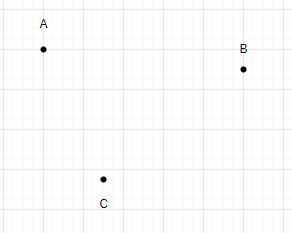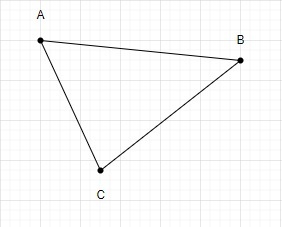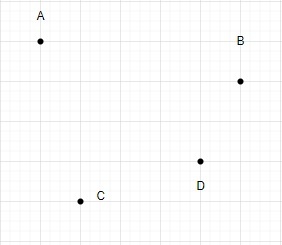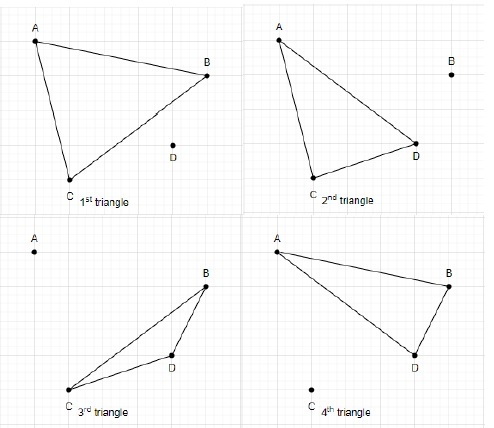 Backend Development
Backend Development
 C++
C++
 If no more than two points in the plane are collinear, what is the number of triangles?
If no more than two points in the plane are collinear, what is the number of triangles?
If no more than two points in the plane are collinear, what is the number of triangles?
Let's see how to count the number of triangles on a plane given n points, and limit the collinear points to no more than two.
Calculating the number of triangles in a plane with no more than two collinear points is a typical problem in computational geometry, which is applied in computer graphics, image processing, and other fields of computer science.
For example, when creating a 2D image from a 3D scene in 3D graphics, the problem may arise of calculating triangles in a plane with no more than two collinear points. In this case, the triangle counting process can be used to determine how many triangles are present in the final 2D image after projecting the 3D scene onto a plane. This allows you to determine the complexity of the scene and increase rendering speed.
In image processing, we may want to count the number of unique objects or shapes in an image, this problem is helpful. In this case, we can represent the image as a collection of points on a plane, and then we can count the number of triangles that can be created between these points by applying triangle counting techniques. We can determine the approximate number of different items or shapes in an image by counting the number of triangles formed.
illustrate
Let us understand this problem through a few examples and try to solve it.
The purpose is to determine how many triangles are formed on a plane with n points such that no more than two points are collinear.
Example -
Assume N is the number of points on the plane.
N = 3

Using these points we can only draw a triangle.

Therefore, the total number of triangles formed using 3 points is 1.
Let N = 4

Let's draw a triangle using these four points.

The total number of triangles formed using 4 points is 4.
Let's look at some of the math involved in calculating the number of triangles. This can be obtained using permutations and combinations. To build a triangle, you need 3 points out of the total at a time.
Thus, if a plane contains n points and no more than two of them are collinear, the number of triangles in the plane is given by the following formula.
$$\mathrm{n_{C_{3}}\:=\:\frac{n(n-1)\:(n-2)}{6}}$$
method
The program finds the number of triangles in the plane if no more than two points are collinear, using the following algorithm.
Take the number of points on the plane as input and limit it to no more than two collinear points.
Use the above formula to calculate the total number of triangles.
Print the total number of triangles as output.
Example
C program to calculate the number of triangles in a plane if no more than two points are collinear.
#include <iostream>
using namespace std;
int main() {
int number_of_points = 4;
int number_of_triangle;
number_of_triangle = number_of_points * (number_of_points - 1) * (number_of_points - 2) / 6;
cout << "Total number of triangles formed using " << number_of_points<< " points = " << number_of_triangle << endl;
return 0;
}
Output
Total number of triangles formed using 4 points = 4
Complexity
Time complexity: O(1) because this code performs a fixed number of calculations regardless of the input size.
Space Complexity: O(1) because the code uses a fixed number of variables to store input values and results regardless of the size of the input.
in conclusion
In this article, we try to explain the method to find the total number of possible triangles with n given points, with the constraint that no two points are collinear. I hope this article helps you learn this concept better.
The above is the detailed content of If no more than two points in the plane are collinear, what is the number of triangles?. For more information, please follow other related articles on the PHP Chinese website!

Hot AI Tools

Undresser.AI Undress
AI-powered app for creating realistic nude photos

AI Clothes Remover
Online AI tool for removing clothes from photos.

Undress AI Tool
Undress images for free

Clothoff.io
AI clothes remover

Video Face Swap
Swap faces in any video effortlessly with our completely free AI face swap tool!

Hot Article

Hot Tools

Notepad++7.3.1
Easy-to-use and free code editor

SublimeText3 Chinese version
Chinese version, very easy to use

Zend Studio 13.0.1
Powerful PHP integrated development environment

Dreamweaver CS6
Visual web development tools

SublimeText3 Mac version
God-level code editing software (SublimeText3)

Hot Topics
 1386
1386
 52
52
 Java program to calculate the area of a triangle using determinants
Aug 31, 2023 am 10:17 AM
Java program to calculate the area of a triangle using determinants
Aug 31, 2023 am 10:17 AM
Introduction The Java program for calculating the area of a triangle using determinants is a concise and efficient program that can calculate the area of a triangle given the coordinates of three vertices. This program is useful for anyone learning or working with geometry, as it demonstrates how to use basic arithmetic and algebraic calculations in Java, as well as how to use the Scanner class to read user input. The program prompts the user for the coordinates of three points of the triangle, which are then read in and used to calculate the determinant of the coordinate matrix. Use the absolute value of the determinant to ensure the area is always positive, then use a formula to calculate the area of the triangle and display it to the user. The program can be easily modified to accept input in different formats or to perform additional calculations, making it a versatile tool for geometric calculations. ranks of determinants
 Written in C++, find the number of triangles formed by a set of points on three lines
Sep 09, 2023 am 09:53 AM
Written in C++, find the number of triangles formed by a set of points on three lines
Sep 09, 2023 am 09:53 AM
Now we get several points present in 3 rows; for example, we need to find out how many triangles these points can form Input:m=3,n=4,k=5Output:205Input:m=2,n=2, k=1Output:10 We will apply some combinatorial mathematics to solve this problem and formulate some formulas to solve this problem. Method to find a solution In this method we will devise a formula: applying combinatorics to the current situation, this formula will provide us with the result. C++ code for the above method This is the C++ syntax we can use as input to solve the given problem - example #include<bits/stdc++.h>#define
 How to type the point '丶' using the keyboard?
Feb 15, 2024 pm 01:51 PM
How to type the point '丶' using the keyboard?
Feb 15, 2024 pm 01:51 PM
When typing on a keyboard, many users are curious about how to type the point "丶" on the keyboard? So let’s take a look at the method that the editor brings to you on how to type this “丶” symbol on the keyboard. 1. Click "丶" and type directly on the keyboard [dian]. You will see the punctuation mark [丶] on the selection bar. 2. Special symbols In the Sogou Pinyin input method, when switching to Chinese mode, pressing the v key will cause some special symbols to appear. These symbols include numbers (eg: v123), dates (eg: v2013/1/1), calculations (eg: v1+1) and functions (eg: v2~3). These symbols make it easy to enter a variety of different information. 2. Then press the number key again, any number from 0 to 9 can be used
 How to check if three points are collinear in Java?
Sep 05, 2023 pm 06:41 PM
How to check if three points are collinear in Java?
Sep 05, 2023 pm 06:41 PM
If three points lie on a straight line, they are said to be collinear. If the points are not on the same straight line, they are not collinear. This means that if three points (x1,y1), (x2,y2), (x3,y3) are on the same straight line, they are collinear. Among them, x1, y1, x2, y2, x3, y3 are points on the x-axis and y-axis, (x1, y1), (x2, y2), (x3, y3) are the coordinates. Mathematically, there are two ways to determine whether three points are collinear. Find the area of a triangle by using the points. If the area of the triangle is zero, then the three points are collinear. Formulatofindareaoftriangle=0.5*[x1*(y2-y3)+x2*
 C++ program to print multiplication table in triangle form
Sep 15, 2023 pm 01:21 PM
C++ program to print multiplication table in triangle form
Sep 15, 2023 pm 01:21 PM
To remember some basic multiplication results in tabular or graphical form, use the multiplication table. This article will introduce how to use C++ to generate a multiplication table that looks like a right triangle. Triangular notation is effective in the few cases where a large number of results can be easily memorized. In this format, the table is displayed row by row and column by column, with each row containing only the entries that populate that column. To solve this problem, we need basic loop statements in C++. To display the numbers in a triangular fashion, we need nested loops to print each line one by one. We will see how to solve this problem. Let us see the algorithm and implementation for better understanding. The algorithm takes the number of rows of the multiplication table we want, let's say n. For i from 1 to n, do the following. For j ranging from 1 to i,
 How to find the minimum height of a triangle given base and area in Java?
Aug 26, 2023 pm 10:25 PM
How to find the minimum height of a triangle given base and area in Java?
Aug 26, 2023 pm 10:25 PM
We have the area 'a' and the base 'b' of the triangle. As per the problem statement, we need to find the minimum height 'h' using Java programming language. As we know, when the base and height are given, the area of a triangle is −$$\mathrm{area\:=\:\frac{1}{2}\:*\:base\:*\: Height}$$ By using the above formula, we can get the height from -height=(2*area)/base and then by using the built-in ceil() method, we can get the minimum height. Show you some examples to show you the Chinese translation of Instance-1: Example-1 Suppose the given area = 12 and base = 6 and then use the formula
 Programming in C++, find the number of paths from one point to another in a grid
Aug 29, 2023 pm 10:25 PM
Programming in C++, find the number of paths from one point to another in a grid
Aug 29, 2023 pm 10:25 PM
In this article, we are given a problem where we need to find the total number of paths from point A to point B, where A and B are fixed points, i.e. A is the upper left corner point in the grid and B is the Lower right corner point, for example −Input:N=5Output:252Input:N=4Output:70Input:N=3Output:20 In the given problem, we can formalize the answer and derive the result through simple observations. Method of finding the solution In this method we come up with a formula by observing that when crossing the grid from A to B we need to go right n times and down n times which means we need to find all possible path combinations, so we get
 Maximum number of distinct straight lines through a point in C
Aug 26, 2023 am 10:25 AM
Maximum number of distinct straight lines through a point in C
Aug 26, 2023 am 10:25 AM
We get the number N for each line and the coordinates of the two points (x1,y1) and (x2,y2). The goal is to find the maximum number of straight lines from the given straight lines that can pass through a single point such that no two straight lines cover each other and no rotation is performed. We will represent the straight line as (pair)m,c) where y=mx+c and m is the slope m=y2-y1/x2-x1 Given c1!=c2, lines with the same m are parallel. We will calculate different slopes in meters. For a vertical line, if x1=x2, then slope=INT_MAX, otherwise m. Let us understand with an example. Input Line1(x1,y1)=(4,10)(x2,y2)=(2,2)Line2(x1,y1)=(2



